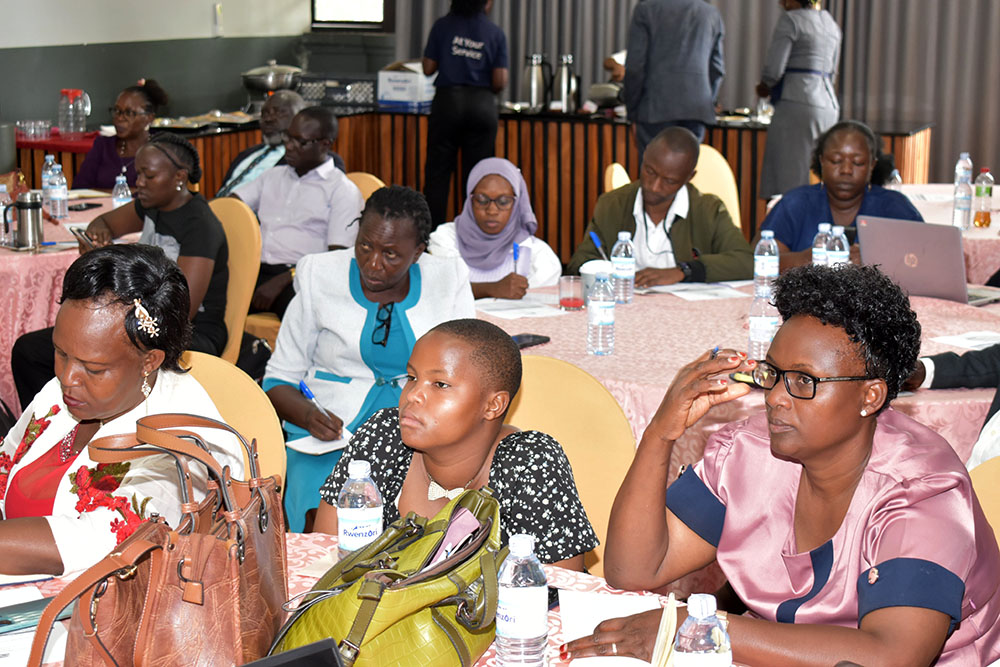Govt planning to block unqualified school board members
“We are reviewing the Education Act, and we are going to put specific qualifications for one to be a member of the board of governors and a member of the school management committee.”
Clare Arinitwe delivering the presentation of issues ranging from dilapidated infrastructure, under-staffing, inadequate funding, overcrowded classrooms among others. (Courtesy photo)
__________________
In a bid to ensure competent leadership in supervising school affairs, the education ministry is planning to bar unqualified members from sitting on school boards, according to a highly placed source.
“We are reviewing the Education Act, and we are going to put specific qualifications for one to be a member of the board of governors and a member of the school management committee,” he says.
The source says this is being done to deter school owners from selecting incompetent board members, some of whom the source says are often selected based on favouritism, friendship or personal connections but not on merit.
The Government official, who preferred anonymity, made this statement while clarifying the difference between government-aided and government-owned schools.
The ministry official made this revelation on Wednesday, October 15, 2025, at Fairway Hotel during an education sector anti-corruption working group meeting that was convened by the Anti-Corruption Coalition Uganda (ACCU).
“So, if you have been choosing Amos as your friend to be a member, the qualifications will now eliminate him.”
Some of the officials at the event. (Courtesy photo)
The event was attended by a senior district education officer, town clerks from the districts of Arua and Mukono. Several municipal inspectors of schools from various districts, including Iganga and from the West Nile region were also present.
The event was also attended by over 15 activists from civil society, such as Marlon Agaba, the executive director of ACCU, Transparency International, as well as student leaders from various secondary schools who represented their youth integrity clubs.
Also represented were the Uganda Debt Network and West Nile Anti-Corruption activists.
Challenges schools are facing
Loy Nantongo Wamala, Mukono’s central division’s town clerk, voiced concerns faced by schools in her locality.
“We cannot say that we are moving to a new Uganda, yet the students lack adequate computers to learn,” she lamented, referring to underfunded computer laboratories in government-aided schools. She recommended a deliberate effort from the Government and other stakeholders to address this gap to boost computer literacy among these teenage learners to make them competent in this digital era.
Ayub Khamish, a senior education officer based in Arua district, pointed out infrastructure disparities within his district. He noted that staff quarters are not in a desirable condition in some schools.
“Staff quarters are not in good condition. We appeal to the government to step up infrastructure grants,” he emphasised.
The local government ministry was represented by assistant commissioner in charge of inspection Silver Tindizarira, who advised civil society organisations to acknowledge the achievements of the Government.
“Appreciate the good deeds the Government does so that government representatives do not shun your meetings,” he advised.
Infrastructure challenges
Event convener Marlon Agaba (ACCU’s executive director) commended youth integrity clubs but also decried the poor state of infrastructure in certain schools across the country, especially in eastern Uganda.
“You go to some of these schools and they are completely dilapidated,” he said. He noted that it is vital to target young people (teenage learners) to raise a generation of integrity.
Project officer Claire Mapesa, a retired teacher, presented a report titled: Anti-Corruption: Key Challenges and Solutions, which delved deeper into the role of education in national development and also showcased district-level impact for both Namutumba and Iganga districts where a recent study was conducted by ACCU.
She said they used Busoga as a case study and noticed a computer crisis with stark disparities in accessing computers in many of the schools.
In Kugulu College, for instance, she noted that 3,000 students shared only 40 computers, which is a ratio of 1:75. The research also revealed that there are gaps in the implementation of the TELA system, which is meant to curb teacher absenteeism.
“We also need to fast-track teacher training and explore online solutions; we have had issues in the sector,” Mapesa explained.
While sharing report findings, she noted that only 36 out of 99 schools have TELA charging systems.
“In some cases, attendances have been manipulated,” she revealed.
Among the recommendations, ACCU suggested that schools ought to have a reliable power source.
During the event, the education ministry official also revealed that a new policy is in the pipeline to address school feeding challenges, but this will first be agreed upon through the parent-teacher association (PTA).